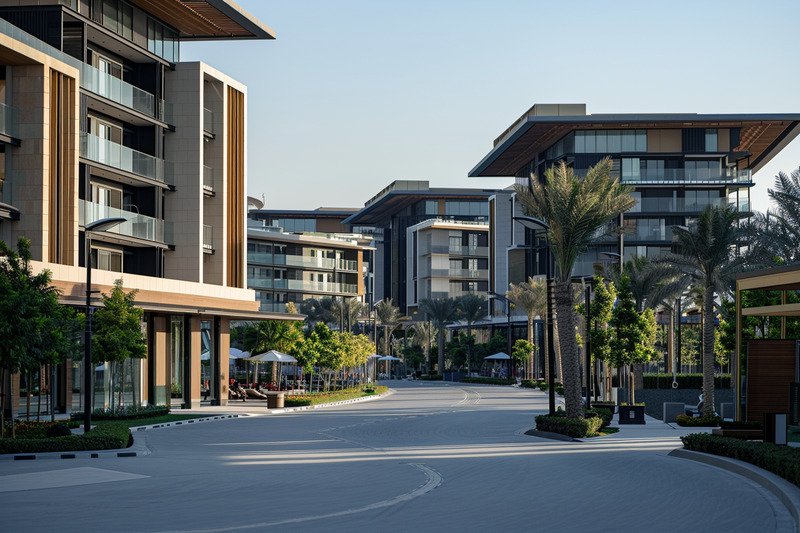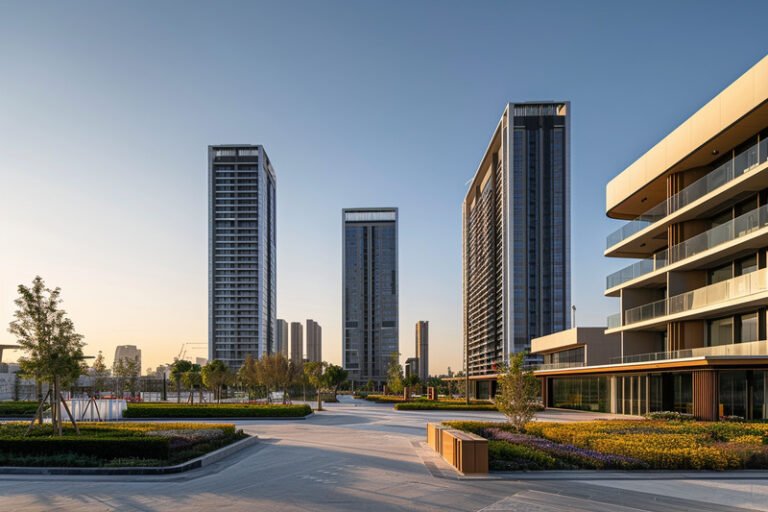Financing Options for Off-Plan Property Purchases

Financing off-plan properties in Dubai offers diverse options for investors. Developer payment plans and mortgages remain popular, but innovative solutions like crowdfunding and joint ventures are gaining traction. Each financing method presents unique advantages and potential risks in the Dubai market.
Understanding these options is crucial for making informed investment decisions in Dubai’s dynamic real estate landscape. The right financing strategy can significantly impact the success of your off-plan property purchase. There are various financing options available for offplan property purchases, such as mortgages, developer financing, or personal loans. Each option has its own pros and cons, and it’s important to carefully consider your individual financial situation and long-term goals before making a decision. Working with a reputable financial advisor or mortgage broker can help you navigate these options and ultimately make the best choice for your offplan property purchase.
Dubai's property market offers flexible payment plans from developers, often including post-handover options. These plans can be attractive for investors looking to spread payments over time, potentially reducing initial capital requirements.
Mortgage options for off-plan properties in Dubai have expanded in recent years. Many banks now offer construction-linked payment plans, allowing buyers to make payments as the project progresses. This can be advantageous for managing cash flow during the construction phase.
Let us help you find the perfect property. Contact us to get started.
Crowdfunding platforms are emerging as alternative financing sources in Dubai's real estate market. These platforms allow multiple investors to pool resources, potentially opening up opportunities for smaller investors to participate in larger projects.
Key Takeaways
Dubai's off-plan property market offers diverse financing options for investors. The city's robust real estate sector, coupled with innovative financial products, provides flexibility and accessibility for buyers. From developer payment plans to specialized mortgage products, investors can choose strategies that align with their financial goals and risk appetite. Understanding these options is crucial for making informed decisions in Dubai's dynamic property landscape.
Developer payment plans are popular in Dubai, offering installments tied to construction milestones. These plans often include post-handover options, allowing investors to pay a portion of the property cost after receiving the keys. This approach can ease cash flow concerns and make high-value properties more accessible.
Mortgage options in Dubai cater specifically to off-plan purchases. Banks offer pre-approval, post-handover, and construction-linked mortgages. These products are designed to accommodate the unique timelines and risks associated with off-plan properties, providing buyers with financial support throughout the development process.
Bridging loans serve as short-term financing solutions for Dubai's off-plan market. While they come with higher interest rates, they can be valuable in specific scenarios, such as securing a property before selling an existing asset or managing cash flow during construction delays.
Personal savings and investments remain a preferred option for many Dubai property buyers. This approach eliminates interest payments and reduces overall debt, making it attractive for risk-averse investors or those seeking to maximize their returns in Dubai's lucrative real estate market.
Crowdfunding platforms have emerged as innovative financing options in Dubai's off-plan sector. These platforms allow investors to pool resources for high-value projects, democratizing access to premium properties and spreading risk across multiple participants.
Developer Payment Plans
Dubai's real estate market offers attractive developer payment plans for off-plan properties. These plans are designed to make property investments more accessible and manageable for buyers. Developers in Dubai typically structure payments to align with construction milestones, allowing investors to spread costs over time.
Common plans include the 30/70 split, where 30% is paid during construction and 70% upon completion. Some developers offer even more favorable terms, such as 20/80 or 10/90 splits. Monthly or quarterly installment options are also available, providing flexibility for various budgets.
When considering a developer payment plan in Dubai, carefully review the terms. Pay attention to payment schedules, interest charges, and penalties for missed payments. Assess how the plan aligns with your financial situation and investment goals.
Dubai's property market is known for its innovative payment structures. Some developers offer post-handover payment plans, allowing buyers to pay a portion of the property cost after taking possession. This can be particularly attractive for investors looking to generate rental income to offset payments.
Always consult with a real estate professional or financial advisor before committing to a payment plan. They can help you navigate the intricacies of Dubai's real estate market and ensure you choose a plan that best suits your needs and financial capabilities.
Mortgage Options for Off-Plan Properties
Mortgage options for off-plan properties in Dubai offer unique features tailored to buyers' needs. The mortgage-in-principle provides pre-approval before property completion, giving buyers an edge in negotiations and financial planning.
Post-handover mortgages are applied for once the property is ready for occupancy. Construction-linked mortgages release payments in stages during the building process, allowing for spread-out payments.
Some lenders offer off-plan specific mortgages with flexible terms to accommodate the uncertainties of unfinished properties. These options often come with stricter eligibility criteria and higher down payment requirements compared to mortgages for completed properties.
Dubai's off-plan mortgage market is competitive, with various banks and financial institutions offering diverse products. It's essential to research and compare different lenders' offerings to find the most suitable option for your specific needs and financial situation.
When considering an off-plan property mortgage in Dubai, factor in potential changes in the real estate market and construction timelines. This can help you make a more informed decision and choose a mortgage product that aligns with your long-term investment goals.
Bridging Loans
Bridging loans in Dubai's real estate market provide short-term financing for off-plan property buyers. These loans bridge the gap between property purchase and long-term funding availability. Typically used when buyers have committed to an off-plan property but haven't sold their current home or secured a traditional mortgage, bridging loans offer quick access to funds for 6 to 18 months.
In Dubai, bridging loan applicants must provide a clear exit strategy, often involving the sale of an existing property or arrangement of a conventional mortgage. Loan amounts are usually based on the property's value, with lenders offering up to 75% of the property's worth.
Interest rates for bridging loans in Dubai are higher than standard mortgages, reflecting the short-term nature and increased risk for lenders. Buyers should factor in arrangement fees and valuation costs when considering this option.
It's crucial to carefully assess your financial situation and consult with a local financial advisor before opting for a bridging loan in Dubai's real estate market. While they offer flexibility, bridging loans can be a more expensive financing option.
Personal Savings and Investments
In Dubai's dynamic real estate market, personal savings and investments are popular for off-plan property purchases. This financing method offers advantages like avoiding interest payments and reducing debt. Investors have more control and aren't subject to strict mortgage requirements. However, careful financial assessment is crucial.
When considering this option, evaluate your liquid assets, including cash savings, stocks, and bonds. Factor in the initial deposit, typically 10% to 20% of the property's value, and subsequent installments during construction. Maintain a separate emergency fund.
Diversify your investment portfolio to mitigate risks associated with off-plan purchases. Mix low-risk and high-yield investments for balanced returns and stability. This strategy can help protect your investment in Dubai's property market.
Consult a financial advisor to ensure using personal savings aligns with your long-term goals. They can provide insights specific to Dubai's real estate landscape and help safeguard your financial security.
Crowdfunding for Property Investments
Crowdfunding has revolutionized off-plan property investments in Dubai, offering a unique way to participate in the emirate's thriving real estate market. This innovative financing method allows investors to pool resources, enabling entry into high-value projects with smaller capital outlays. By leveraging online platforms that connect developers with investors, crowdfunding has democratized access to Dubai's lucrative property sector.
These platforms carefully vet projects and manage legal aspects, simplifying the investment process. To participate, investors create accounts, review opportunities, and select projects aligned with their goals. Dubai's crowdfunding landscape typically offers equity, debt, or hybrid investment models, each with distinct risk-return profiles.
Investors must thoroughly understand the terms, conditions, and fee structures associated with each opportunity. Careful due diligence is crucial, including researching the platform's credibility, the developer's track record, and specific project details.
While crowdfunding opens doors to previously inaccessible investments in Dubai's real estate market, it's essential to approach each opportunity with caution and informed decision-making.
Joint Ventures and Partnerships
Joint ventures and partnerships are popular financing options for off-plan property purchases in Dubai. These collaborations allow investors to pool resources, share risks, and increase purchasing power. By partnering with others, investors can access larger or more lucrative projects that might be out of reach individually.
When considering a joint venture in Dubai's real estate market, it's crucial to establish clear terms and agreements from the start. Define each party's financial contributions, roles, responsibilities, and profit-sharing arrangements. Consult with legal professionals to draft detailed contracts that protect all parties' interests.
Joint ventures in Dubai can take various forms, such as partnering with local developers, forming syndicates with other investors, or collaborating with real estate investment trusts (REITs). Each structure offers unique advantages and potential challenges in the emirate's property market.
Partnering with a local developer can provide valuable insights into Dubai's real estate landscape and important connections. Joining a syndicate can help diversify your investment portfolio across different projects or areas in the city.
Before entering any partnership in Dubai, conduct thorough due diligence on potential partners and the proposed project. Evaluate their track record, financial stability, and reputation in the local market to ensure a successful and profitable collaboration.
Government-Backed Financing Schemes
Dubai's government offers various financing schemes to support off-plan property purchases, making it easier for investors to enter the market. These initiatives aim to boost homeownership and stimulate the real estate sector. Notable programs include the Mohammed Bin Rashid Housing Establishment (MBRHE) for Emirati nationals and collaborations between the Dubai Land Department (DLD) and local banks for preferential mortgage rates. The government has also implemented regulations to protect buyers' interests and streamline the purchasing process.
The MBRHE provides interest-free loans to Emirati nationals for off-plan properties. This program specifically targets UAE citizens, encouraging them to invest in the local real estate market.
DLD partnerships with local banks offer competitive interest rates and flexible repayment terms for off-plan purchases. These collaborations make financing more accessible to a wider range of investors.
The Oqood system, implemented by the government, registers off-plan sales and ensures developers fulfill their obligations. This safeguard helps protect buyers' interests throughout the purchasing process.
For expatriate investors, UAE Central Bank guidelines allow banks to finance up to 50% of an off-plan property's value. This policy creates opportunities for non-UAE nationals to participate in Dubai's growing real estate market.
Digital platforms introduced by the government streamline the purchasing process for off-plan properties. These systems reduce paperwork and expedite approvals, making the overall experience more efficient for buyers.
Conclusion
Dubai's off-plan property market offers diverse financing options for investors. Developer payment plans provide flexibility, allowing buyers to spread costs over time. These often include attractive terms like 30/70 or 40/60 splits between construction and handover.
Mortgages remain a popular choice, with many UAE banks offering competitive rates for off-plan purchases. Some lenders provide up to 50% financing for non-residents, while UAE nationals and residents may secure up to 75% of the property value.
Bridging loans offer short-term solutions for those awaiting funds or needing to complete quickly. These can be particularly useful in Dubai's fast-paced real estate market, where opportunities may arise suddenly.
Alternative methods like crowdfunding are gaining traction in Dubai. These platforms allow multiple investors to pool resources, making high-value properties more accessible to a broader range of buyers.
When considering financing options, assess your financial situation carefully. Consult with Dubai-based financial advisors or real estate professionals to determine the best approach for your specific circumstances in the emirate's unique property landscape.
Let us help you find the perfect property. Contact us to get started.





